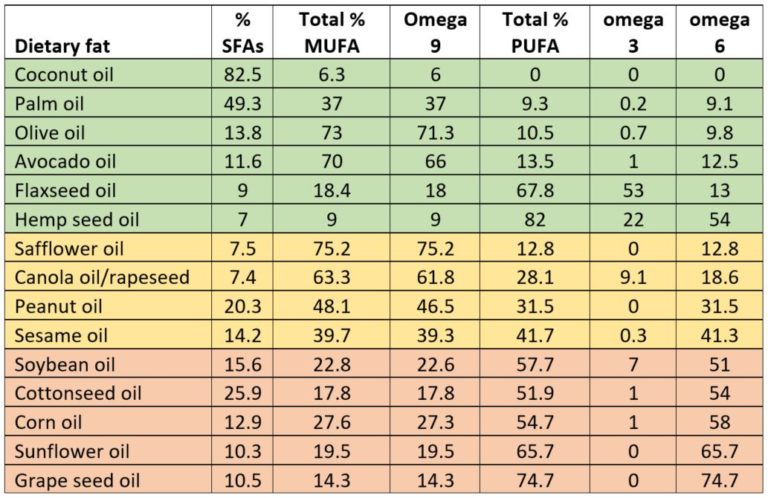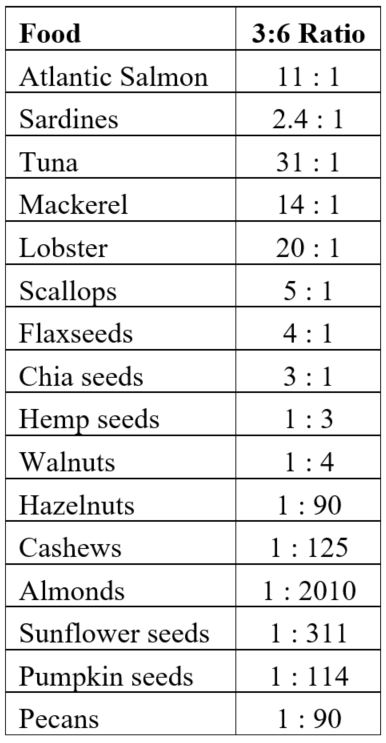Inflammation is the underlying cause of all the chronic conditions we have today and that includes heart disease, cancer, diabetes, autoimmune diseases like arthritis, MS, Crohn’s, and celiac, neurological issues like Alzheimer’s, dementia, mood disorders, and anxiety. Inflammation is also the cause of the aches and pains associated with getting older, slow recovery of muscles from workouts, slow tissue repair, dermatitis, fasciitis, tendonitis, any “itis” is inflammation. If you have any inflammatory conditions then you will want to continue reading.
Fats play a major role in our health and disease processes. Fat is an essential component of our diet and should contribute anywhere from 10 – 30% of our total daily calorie intake. But which fats are healthy and which ones contribute to disease?
Fats all have different compositions of fatty acids. I made a chart that shows the breakdown of each type of fat and then sorted them into groups of fats you should avoid (red), fats that have a moderate impact on inflammation (yellow) but I would still avoid these if dealing with inflammation, and fats that you should consume to help reduce inflammatory conditions (green).
Fatty Acid Composition as % of total

What are the various types of fatty acids and how do they impact inflammation?
Saturated Fatty Acids (SFAs)
SFAs have carbon chains that are “full” or “saturated” with hydrogen atoms, there are no double bonds and they are very stable and therefore good for cooking. I will focus on all the different types of SFAs in another article.

Unsaturated Fatty Acids
Monounsaturated fatty acids (MUFAs), meaning it has 1 double bond.

Polyunsaturated fatty acids (PUFAs), meaning it has more than 1 double bond.

Essential fatty acids (EFAs) are fatty acids that we must consume because our cells cannot make them. There are 3 EFAs: Omega 3, Omega 6, and Omega 9. Omega 3 and 6 are PUFAs and Omega 9 is a MUFA.
Fats that have more double bonds between carbons have a higher probability of being unstable and can be damaged by heat and even light, and oxidized by oxygen….keep open bottles of oils in a cool dark cupboard.
Health Effects of Omega 3, 6, and 9
Omega 3 is Anti-inflammatory
Omega 3 has been shown in numerous research publications to have a protective effect against cardiovascular disease, diabetes, cancer, Alzheimer’s, dementia, depression, and neurological conditions.
Omega 3 is metabolized into EPA and DHA that decrease the immune response and cause vasodilation (reduce blood pressure) and act as anticoagulants by reducing blood clotting.
Highest natural sources are salmon, mackerel, sardines, anchovy, oyster, tuna, halibut, snapper, crab, trout, herring, whitefish, lobster, octopus, swordfish, and cod. The 2 plant sources are flaxseeds and chia seeds. If you don’t eat fish, flax, or chia seeds, then you might want to consider an omega 3 supplement such as fish oil or krill oil.
Omega 9 is Anti-inflammatory
Omega 9 has been shown to facilitate wound healing, repair skin, reduce inflammation and has been shown to have a modulatory effect on cancer, heart disease, and autoimmune diseases due to anti-inflammatory effects.
Highest sources of omega 9 are olive oil and avocado oil. Safflower and canola oil also have high omega 9, however, they are refined processed oils that go through damaging bleaching and heating processes; I prefer to stick with oils that are cold pressed.
The extremely high amount of omega 9 in olive oil is thought to contribute to the health benefits of the Mediterranean diet.
Omega 6 is Pro-inflammatory
Omega 6 is metabolized into a molecule called arachidonic acid, which stimulates the immune response and can act as a vasoconstrictor (increases blood pressure) and increases platelet aggregation (blood clots). We need SOME omega 6 fatty acids, they are essential and help the immune system attack pathogens. The problem is that the Western diet includes way too much! If you eat any nuts or seeds at all then you never have to worry about not having enough omega 6. Excess omega 6 increases inflammation and inflammatory diseases.
If you are dealing with inflammatory conditions, including anything from cancer, heart disease, diabetes, to arthritis, sore and swollen joints, rashes, irritable bowel, or even frequent colds, then you will want to minimize your consumption of foods containing omega 6. Read ingredients labels, you want to eliminate any foods that contain the worst inflammatory oils (red in chart above): Grapeseed, sunflower, corn, cottonseed and soybean oil.
Hemp oil contains a fair amount of omega 6 but it is also high in omega 3, giving it a #;1 ratio, which is good. I would minimize sesame, peanut, canola, and safflower because they are refined processed oils (yellow in chart).
If you have inflammatory issues then the most important thing you can do is to reducing your intake of omega 6 oils and increasing your intake of omega 3 and 9.
The best oils (green in chart above) that have the lowest amount of omega 6 are avocado oil, coconut oil, olive oil, palm oil (too bad palm oil farming is killing rain forests), and flaxseed oil. Avocado oil is the most stable for cooking but you can also cook with coconut and olive oil of not too hot or for too long. Never cook flaxseed oil.
Fun Fact: Vegetable oils are not made from vegetables, they are made from corn (grain) or soybeans, olives, nuts, or seeds.
The RATIO of Omega 3 to omega 6 is important
Ultimately, it is important to balance omega 3 and 6 so that you have as close to a 1:1 or 1:2 ratio as possible in your overall diet. Typical Western diets are about 1:15 (omega 3 : omega 6) or higher! This is because many people consume a large amount of refined seed oils and not enough fish and whole foods.
Here are some examples of ratios of Omega 3 : Omega 6 in various foods.

Even though nuts and seeds have high ratios in favour of omega 6, the amount you would get in a handful of nuts or seeds is low and the health benefits of all the other nutrients in nuts and seeds is far more beneficial. I think the issue is the seed oils. Extracting oils from seeds and then refining and processing them makes them a much higher concentration of omega 6 and potentially oxidized and damaged from the refining process. Stick to the oils highlighted in green in the first chart and eat whole foods.
Fun Fact: Fast food restaurants use unhealthy, refined oils. When food is deep fried, like French fries, then the oil is heated at high temperatures all day long and becomes extremely inflammatory! Don’t eat crap!
References
Omega 3 and their health benefits
Modulatory effects of oleic acid on health and disease
Protective effect of Mediterranean diet: focus on cancer and cardiovascular disease
Omega 6 Fatty Acids and Inflammation
Health Implications of High Dietary omega 6
The Importance of the Omega 3/6 ratio
Oil image from Pixabay
Molecule images from my textbook

